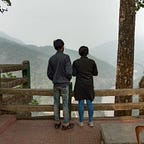Love needs Rilke
For one human being to love another is perhaps the most difficult task of all
Written by: Zeus Ghosh
Few thoughts on Rilke’s Letters to a young poet penned down during the pandemic:
“For one human being to love another is perhaps the most difficult task of all, the epitome, the ultimate test. It is that striving for which all other striving is merely preparation..”
I have no regrets about reading Rainer Maria Rilke a little late in life for I have come to realize that “right timing” is something that was invented by the restless mind which knows no peace. When the entire nation is celebrating the onslaught of a probable war, the day isn’t far when these unfortunate bastards like Rilke, who died loving humanity, will forever be lost to posterity. And, with them will die also their love. But, good riddance! I curse myself for taking this book up at a time when we are so blissfully reveling in our flawless hatred for one another, that any inkling of love is like an unfamiliar jolt to the consciousness, which can potentially impair us for weeks. And, this book is so full of this silly little thing — love, that is.
I wish I were that young, frail man, who, tormented by the vagaries of life, sought advice from Rilke about life and about what it means to be an artist. I wish I had received those ten letters from Rilke — which constitutes this book — first hand, for I can’t imagine a better fulfillment. This is not a review or a critique, for when it comes to Rilke, I am capable of neither. This is merely a remembrance of a man whose prose, as a tempest, ravages your heart and then, as spring, nurtures it anew. “Go within and scale the depths of your being from which your very life springs forth,” Rilke writes. Time and again, with passionate interest and heart-felt humility, he impresses on the young poet to abandon all outwardness and shallow conventions, and urges him to kindle his inner being.
Rilke laments over how human beings, after thousands of years of civilization, still haven’t learnt how to love. Reading his letters, it is overwhelming to find out that a human being can feel so deeply about everything, can care so passionately about all human race. And perhaps, all art is rooted in caring. Perhaps, all problems dissolve in love. On one occasion he writes:
“Perhaps the sexes are more closely related than one would think. Perhaps the great renewal of the world will consist of this, that man and woman, freed of all confused feelings and desires, shall no longer seek each other as opposites, but simply as members of a family and neighbors, and will unite as human beings, in order to simply, earnestly, patiently, and jointly bear the heavy responsibility of sexuality that has been entrusted to them.”
I cannot, even after a million attempts, capture the other-worldliness, the transcendence contained in these letters. ‘Embracing solitude’ remains a recurrent theme in these letters and on one occasion he writes:
“But he who has a pact with aloneness can even now prepare the way for all of this that in the future may well be possible for many, and can build with hands less apt to err. Therefore, dear friend, embrace your solitude and love it. Endure the pain it causes, and try to sing out with it. For those near to you are distant, you say. That shows it is beginning to dawn around you; there is an expanse opening about you. And when your nearness becomes distant, then you have already expanded far: to being among the stars. Your horizon has widened greatly. Rejoice in your growth. No one can join you in that.”
These letters are for anyone seeking an authenticate understanding of life. It is surprising how little is spoken of these authors who genuinely inquired into life, who tried passionately to revive a godless human race, who worked tirelessly to instill some love.
“I would like to beg of you, dear friend, as well as I can, to have patience with everything that remains unsolved in your heart. Try to love the questions themselves, like locked rooms and like books written in a foreign language. Do not now look for the answers. They cannot now be given to you because you could not live them. It is a question of experiencing everything. At present you need to live the question. Perhaps you will gradually, without even noticing it, find yourself experiencing the answer, some distant day.”
